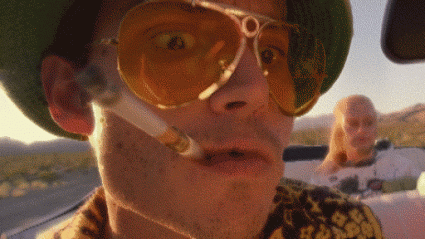PART I: THE HIPPIES
In 1967, a young divorcee and motorcycle enthusiast named Joe Edwards, Jr. left his engineering job in Houston, Texas, and moved to Aspen, Colorado, where he had a great experience several years prior. While having both a engineering and law degree, he started out flipping burgers at the Highlands Ski Area. He steady took other odd jobs, before starting out as a lawyer practicing in the Aspen area. His defining case was in 1967, where he filed an civil rights suit against police chief Guido Meyer, who had been trying to arrest or expel various counterculture vagrants from town. He tried to get a federal judge to give an injunction against Meyer. After finding a quote in an interview with the
Aspen Times, where Meyer angrily admitted his personal dislike of hippies, the judge agreed that their rights had been violated, but couldn't file the injunction, since the police had stopped the harassment. However, it was a victory, and Edwards became known as the hippie lawyer of Aspen. Through this new connection with the counterculture, and the group he helped form the "Citizens for Community Action", he befriended Hunter Stockton Thompson. A journalist originally from Kentucky, Thompson was primarily known for his memoirs of traveling with the notorious "Hell's Angel" motorcycle gang, aptly called
Hell's Angels: The Strange and Terrible Saga of the Outlaw Motorcycle Gangs. He was growing more politically aware after personally witnessing the riots accompanying the 1968 Democratic Convention in Chicago. He had been living outside of town in a ranch called Owl Ranch, which he had bought with the proceeds from the book. He saw the many "freaks and dropouts" moving into the mountains from places like San Francisco, and spoke to the CCA about running a candidate. "Why not challenge the establishment with a candidate they've never heard of? Who has never been primed or prepped or greased for public office? And whose lifestyle is already so weird that the idea of "conversion" would never occur to him?"[1] Thompson later said of the beginnings of the Freak Power movement.
To that end, he contacted Edwards with the idea of running for mayor. ""About 2 or 3 in the morning, he woke me up," Edwards later said. "He called me up, and he started mumbling like he did."[2] The current mayor, Dr. Robert "Bugsy" Barnard, a respected doctor and a Korean War medic, was retiring, and the Republicans were placing relative conservative and shopkeeper Eve Homeyer as their candidate. Thompson and Edwards hoped to shake-up the establishment in town, blow it up, as it were, using their Freak Power Party. They managed to organize the various counterculture residents who were normally apathetic towards the idea of voting, and energize them into voting, by using their unorthodox party and candidate. They had worked in direct view of everyone in Jerome's Tavern on Main Street. The small town in the Rockies became yet another generation battlefield, between the old guard politicians and the new young radicals. As the possibility of an Edward's victory grew, Thompson in turn soon had his own ideas about possibly running for Sheriff. He had some strange ideas for the time, but was convinced there might be enough of an base there to potentially start a new nationwide movement. Still, he postponed those plans, at least to see if Edwards would actually win.
The answer would come on Election Day, November 1969. After a number of controversies, including an attempt by Thompson and Edwards to complain to the Colorado DA over Barnard's radio warnings about "voter intimidation," and a recount after it was found a number of absentee ballots weren't properly sent, meaning some votes for Edwards hadn't come in,[3] Edwards had, against all odds, managed a victory, surprising all involved, especially Edwards and Thompson. Thompson's gambit had worked, and the Aspen establishment had been shaken up. Already, Edwards had plans to ensure protection of local public lands, as well as establish bicycle and walking trails, to ensure the relative health of the citizens.
In light of Edwards victory, Thompson decided to keep his internal promise....
[1] Quote from the OTL "Freak Power in the Rockies" article.
[2] An OTL quote from Edwards, from this recent article:
http://www.aspentimes.com/opinion/columns/tony-vagneur-saddle-sore-100/
[3] This is the POD. These absentee votes were delayed, meaning those votes were late. Thus, Edwards lost by six votes, five of them from absentee ballots.
-----------
Next Up: The New Sheriff in Town
